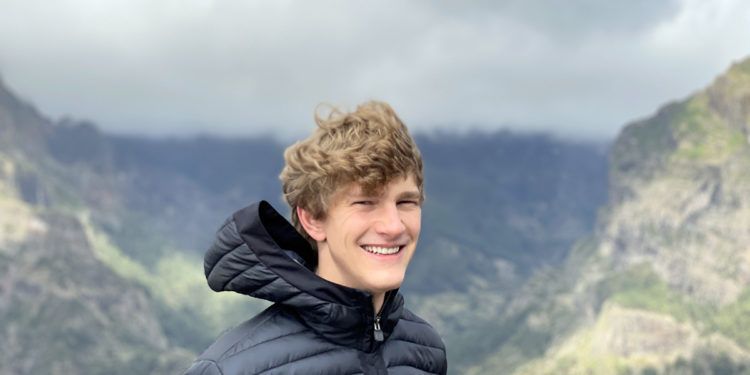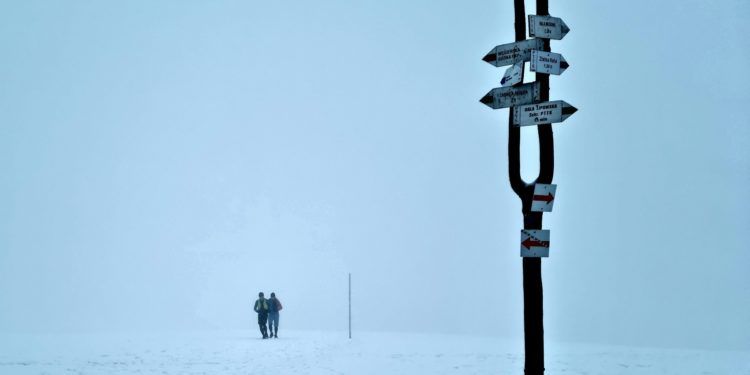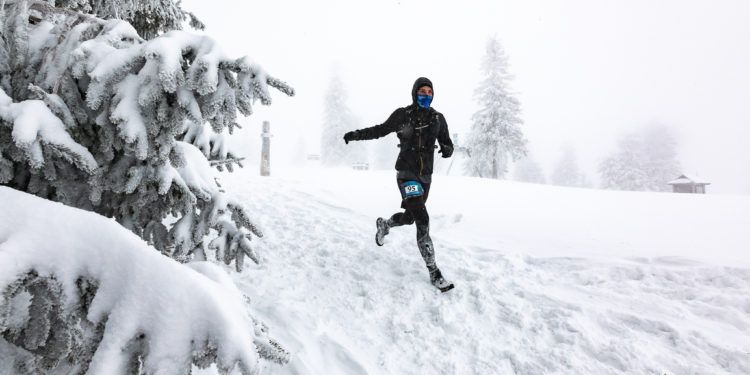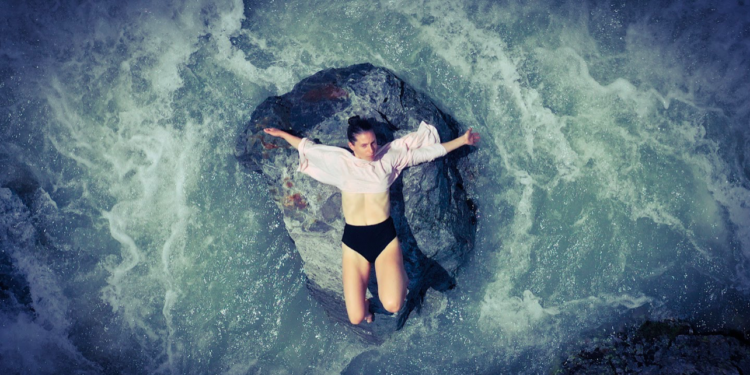Nature should not be copied – conversation with Jan Lisiecki
I will say frankly that I can’t have big expedition plans, it’s difficult for me to go on a multi-day trip, because I just don’t have the time for it. I rather happen to take a short trek or walk in the mountains (fot. Jan Lisiecki)
World-famous Canadian pianist with strong Polish roots. He began his adventure with music at the age of 5, but, last but not least, from an early age he discovered, with great help from his father, the power that comes from communing with nature. His time is filled with travel, concerts and rehearsals, but as soon as he can – he goes on mountain escapades
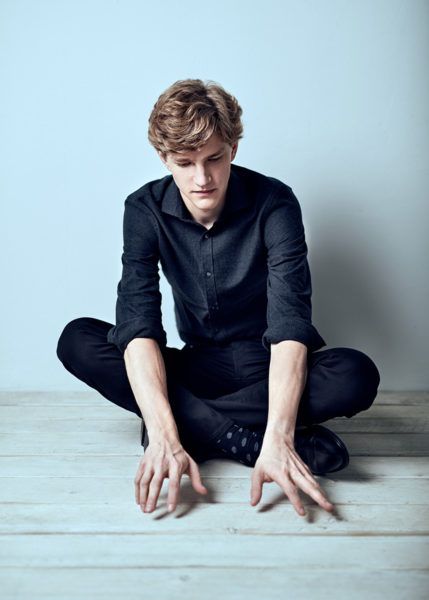 Jan Lisiecki (photo. Christoph Köstlin / Deutsche Grammophone)
Jan Lisiecki (photo. Christoph Köstlin / Deutsche Grammophone)
Piotr Turkot (Outdoor Magazine): You were born in Calgary, not far from the beautiful Rocky Mountains. How do you recall growing up in Canada, your first contacts with wildlife?
Jan Lisiecki: I owe my encounter with nature to my father. My parents moved to Canada as young adults. In Poland, they led a relatively good life, although it must be remembered that the 1980s. it was not a good time. That’s why Dad wanted something different, and above all he wanted to be close to nature. And this – despite the fact that he was often in the Tatras in the mountains of Bavaria, – he could not find in Poland. The 1988 Olympic Games were just held in Calgary, and that was probably the spark – my dad saw then, in the TV reports, Canada as such a magical, beautiful place where you can start all over again. He then decided to move there (his mother came to him after some time). Together they started a new life, practically from scratch.
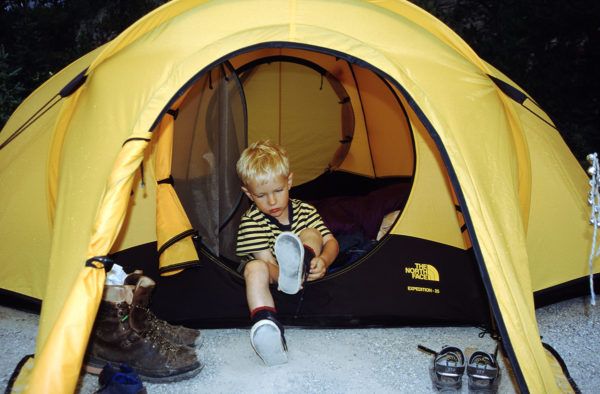 Before I learned to walk, it was on my dad’s back that I “hiked” in the mountains (fot. Jan Lisiecki archive)
Before I learned to walk, it was on my dad’s back that I “hiked” in the mountains (fot. Jan Lisiecki archive)
I was born in 1995, and before I learned to walk, it was on my dad’s back that I “hiked” in the mountains. I was a very active child. My childhood is full of shared experiences with my dad. In the summer we walked a lot, rode bikes, and in the winter we skied. This all happened, even before music came into my life, and I was 5 years old at the time.
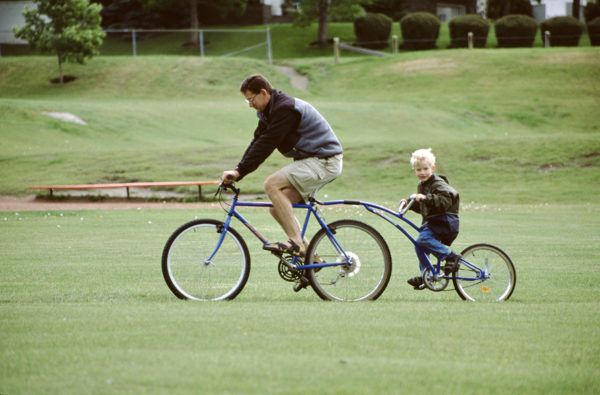 My childhood is full of shared experiences with my dad. In the summer we hiked a lot, rode bikes, and in the winter we skied (fot. Archive Jan Lisiecki)
My childhood is full of shared experiences with my dad. In the summer we hiked a lot, rode bikes, and in the winter we skied (fot. Archive Jan Lisiecki)
My first memory of a trip with my dad?
I fell into a stream… Of course, my dad warned me, because we were on a long hike. But as it is at a campsite, we set up a tent, did something there and of course “chlup!”. And those mountain streams are terribly cold! I also remember that I really liked to put stone walls around the tent. It must have been very tiring for my dad, because not only did he have to carry a heavy backpack, then pitch a tent, prepare a meal, but at the end we necessarily had to build this wall. Anyway, to these stones I had a sentiment. I happened to leave a particular stone on the mountain and cried the whole way back. People on the trail thought I was getting hurt, and I just wanted to go back for my stone…
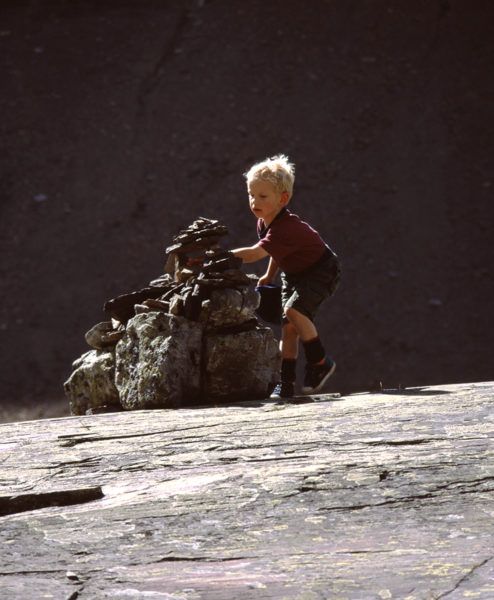 I also remember that I really enjoyed putting up stone walls around the tent (photo. Archive Jan Lisiecki)
I also remember that I really enjoyed putting up stone walls around the tent (photo. Archive Jan Lisiecki)
Many memories are related to skiing – in various conditions, in beautiful weather, but there were also descents when nothing could be seen. It is known that winter in Canada is very harsh, with temperatures dropping as low as -30°C. We may not have traveled in such conditions, but at -15°C everything froze too. I enjoyed skiing from the opening of the slopes until they closed. And we rode and rode until they were already closing the lifts. When I was a little older, I only agreed with the winter concerts in Snowmass, because we could then ski in Aspen – these were contracts that included ski passes.
You started your adventure with music at the age of 5. Over time, exercise probably took you more and more free moments. Was a break from exercise, stress, work for you an encounter with nature?
As much as possible, it is easier to find a moment to think about work when surrounded by nature. When I work a lot with music, I very much need relaxation, a moment of silence, peace and quiet. It happens to me then that I don’t think about anything – I just go ahead and it’s beautiful all around me. I live with music, I live in music, so it is always with me, it accompanies me even in the mountains. But I would never take headphones into the mountains. It’s not even about literal silence: silence is beautiful, of course, especially in winter, when there is snow, which muffles everything and then you hear absolutely nothing. But silence is also the sounds of nature, the forest, the sound of the wind, distant waterfalls and the absence of human activity. Across Canada it is very easy to find desolate places. Nature has always allowed me to escape from the noise of everyday life.
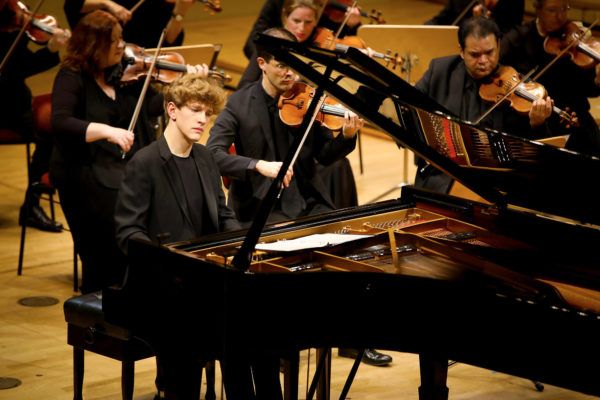 Jan Lisiecki (fot. Peter Rigau / peterrigaud.com)
Jan Lisiecki (fot. Peter Rigau / peterrigaud.com)
You started your career as a young boy. It quickly led to a collaboration with the prestigious Deutsche Grammophon label. You have recordings of Mozart, Beethoven, Mendelssohn appears, Chopin, Schumann – classics, romantics. How does the fascination with nature affect your musical sensitivity?
The best music is music that feels natural, the kind that flows from some source. It is known that every composer has his own inspiration, but of course the music comes from nature. People invented music – first there was singing, then instruments began to be used. The piano may not be an entirely natural instrument (it was constructed, after all), but it can still convey the beauty of nature. The composers mentioned above created music of the highest quality – Mendelssohn, Chopin, Mozart, Beethoven or Bach. Their music is extremely sincere, elegant.
These heights are reached when the music is most organic. I have always said in interviews that Canada has been able to give birth to many artists, musicians. It seems to me that one of the most important reasons is precisely the proximity to nature and large spaces. Above all, this vast space is something I have not encountered anywhere else in the world, and I love it very much.
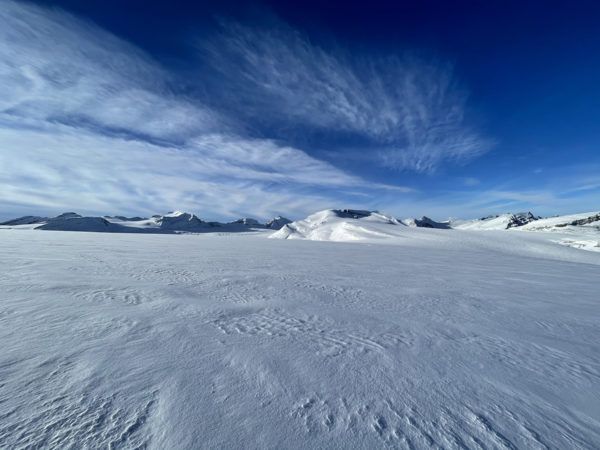 I have always said in interviews that Canada has been able to give birth to many artists, musicians. It seems to me that one of the most important reasons is precisely the proximity to nature and great spaces (phot. Jan Lisiecki)
I have always said in interviews that Canada has been able to give birth to many artists, musicians. It seems to me that one of the most important reasons is precisely the proximity to nature and great spaces (phot. Jan Lisiecki)
Does this reflection coming from nature open you to a certain kind of music? Allows you to make musical choices?
It all depends on whether I am comfortable with a certain kind of music, whether I can assimilate it and, last but not least, whether I can express something through it. I already have something to say, I have my opinions, some vision. I guess it’s also important that during the recording process I try to find its beauty, unique moment and its own language. I want my playing to be as natural as possible. Without unnecessary exaltation or unnecessary romanticism. It’s about leaving the music in its purest form.
I experience the same when I go to the mountains, for example. I don’t mean to see some famous waterfall, where there are railings, a path and stairs. I prefer a simple winding path that I will remember for a lifetime. This is the opposite of the crowd of tourists, with selfie sticks, cameras, who take pictures of themselves at some famous waterfall in Iceland. There is a famous, beautiful place – the Golden Circle. I once had a concert in Reykjavík, then rented a car and drove all over Iceland with my parents. The Golden Circle, yes, beautiful – geysers, Gullfoss waterfall, terrains like from Mars. But you feel like you’re in Disneyland, because everything is concentrated in a small area though. And then, when you drive further, you really see the beauty of these areas. There is no one there anymore. You get the feeling that this place is only yours. It is the same in music. I don’t aim to simply do what everyone else has already done, to duplicate something. I want to realize my own vision, and at the same time I want it to be as simple as possible, without any unnecessary additions.
Some composers refer directly to the sounds coming from nature. One of them was Olivier Messiaen, who used the language of birds in one of his cycles, creating “Catalogue d’oiseaux”. This is a very concrete use of the language of nature. Would you face such a work, or in general would you be fascinated by such explicite music of nature?
Inspiration is something completely different from copying or directly referring to something. The same is true of music interpretations. You can say that Messiaen took advantage of the birdsong. But it seems to me that the best word would be precisely inspiration. It is the closest to me, because that is how I interpret songs. When I see a score that has already been performed, recorded hundreds of times, I ask myself: why should I even play such a piece, such as Chopin’s Piano Concerto No. 1? Every pianist in the finals of the Chopin Competition plays this concerto, and it must be said that they play very well. But why should I play it? I reach for such a piece because I feel inspired, I have some kind of vision. And I think it was the same for Messiaen – birdsong was an example of the ideal for him. This is where you have to be careful, though, because whenever you try to copy something, it can become a caricature. When it comes to being inspired by something, however, the final result is your own creation – it’s no longer a copy.
On Youtube you can find a video from the famous BBC Proms festival in London. The audience at the Proms is very enthusiastic, and although the atmosphere at the Royal Albert Hall seems relaxed, they are waiting for a virtuoso performance. Making my debut in such a place probably causes a lot of stress. Did you have such thoughts to get away from there, so that instead of an audience of several thousand people you would be surrounded by many thousands of trees?
Trepidation is no stranger to me, but I want to be on stage, I need stage challenges. But the story of the Proms is very beautiful. I really enjoy taking public transportation, even to concerts, and this was also the case here in London. We traveled to the concert by subway – it was terribly hot at the time. We leave the subway and walk through Kensington Gardens to the Royal Albert Hall. Everyone is sitting on the grass, playing with dogs, walking or riding bikes, sunbathing, having a good time. And I go and feel this huge stress. Then I thought that it absolutely does not matter to these people that I go to play a concert where there will be an audience of several thousand and which will be broadcast live on TV and radio. Everyone has their own life, their own worries, their own problems. I realized that what I do is not that important, it’s just what I enjoy. Of course, I felt an obligation to those five thousand spectators who will be at the concert, but that is not so important to the world after all. This walk gave me a lot of strength to go out on stage and play. I remember that moment to this day, because you know, it was an important stage in my life, the debut at the BBC Proms.
Stress comes at interesting moments, not necessarily when one expects it. Some important, career-impacting concerts do not cause me any stress at all. And it can happen a simple concert, which for some reason causes nervousness. Then I try to remind myself that I know how to play the piano and I can handle it. In such moments, it’s also important to know that I have a normal life and other interests – beyond music, which I love, of course, and beyond my daily exercises.
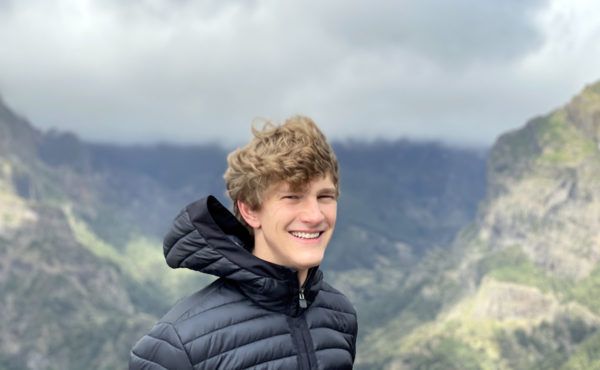 I’ll be honest and say that I can’t have big expedition plans, it’s hard for me to go on a multi-day tour because I just don’t have time for it. I rather happen to take a short trek or walk in the mountains (fot. Jan Lisiecki)
I’ll be honest and say that I can’t have big expedition plans, it’s hard for me to go on a multi-day tour because I just don’t have time for it. I rather happen to take a short trek or walk in the mountains (fot. Jan Lisiecki)
Then let’s go back to these alternative activities to music. When you visit different places in the world, do you also try to go for some forest walks, mountain hikes?
I like cities very much, I like visiting museums and galleries, above all I like walking in cities, because then you can see so many interesting things. I can walk 15 km a day, just watching something. But I also really like to go out of the city. I will say frankly that I can’t have big expedition plans, it’s hard for me to go on a multi-day trip, because I just don’t have time for it. I rather happen to be on a short trek or walk in the mountains.
In addition, I try to be responsible in how I travel, of course I have to be at concerts in specific cities, days and at set times. But in the meantime, instead of going home to Canada (that is, flying long distances), I can just go, often by train, to see something nearby. I visit places within easy reach, ones that interest me. I happen to visit more places in Europe, neighboring countries. I’m lucky enough to travel all the time. For example, last year I was in Bulgaria during the pandemic, where we visited one of the beautiful national parks. We also visited Finland in the north, in Rovaniemi. To some extent this country resembles Canada, looking at the landscape and the mentality of the people.
These are beautiful moments that allow you to relax, get away from everyday life and the world. I live the life of a pianist all the time, where I have to be focused, where I have to think about the next steps, plan my career. One should always have very specific plans. I also have no shortage of worries, there are things that do not work out, then such an escape into nature allows you to gain distance, gives you a sense of strength – after all, my career is not so important, there are other great things to do and see.
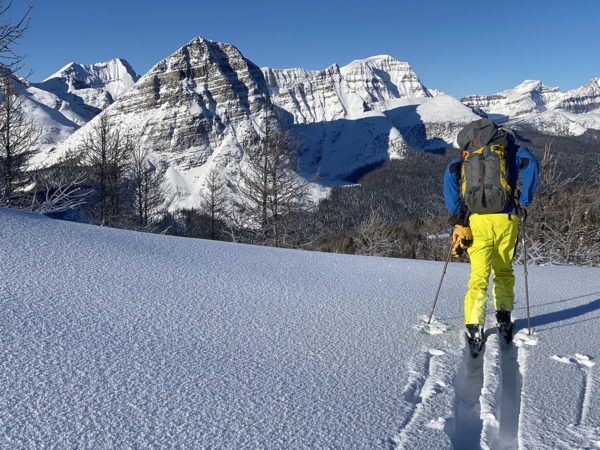 All skitouring photos were taken in Canada, because that’s where I have the equipment and that’s where my dad and I go (fot. Zbigniew Lisiecki)
All skitouring photos were taken in Canada, because that’s where I have the equipment and that’s where my dad and I go (fot. Zbigniew Lisiecki)
One of the pretexts for our conversation in Outdoor Magazine was just photos of skydiving escapades. Where do even the photos from your recent winter posts come from?
All skitouring photos were taken in Canada, because that’s where I have the equipment and that’s where we go with my dad. He knows a lot of routes and takes me to his favorite places. Not only do I have the best guide I could ever dream of, but I also get to spend time with my dad and in nature. In Canada, we can be on skis all day and not see a single person. To be alone, you do not need to drive five hours from Calgary, two is enough. These ski tours are moments that I carry with me afterwards, these memories are with me when I travel and play concerts.
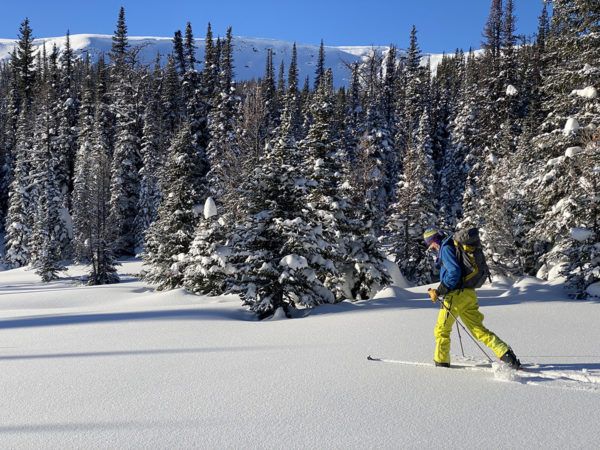 In Canada, we can be out skiing all day and not see a single human being (pic. Zbigniew Lisiecki)
In Canada, we can be out skiing all day and not see a single human being (pic. Zbigniew Lisiecki)
Do you have experience in winter hiking? You know about equipment, route choices, avalanche danger?
Of course, avalanche danger we always study with my dad. I can very easily recognize where it is dangerous, but it is known that it is impossible to completely predict everything in the mountains. You can only choose the most reasonable options, and we always try to do that. We both have full avalanche equipment and know how to use it. The choice of off-road routes is our joint, always thoughtful decision. However, I must add that my dad is in better shape than me. This is unbelievable, because of course I’m young, so I’m the one who should have it, but he spends a huge amount of time in the mountains – this winter he walked 450 km on skis. His form is amazing, sometimes I can barely keep up with him. But we have a wonderful shared experience and a great time.
